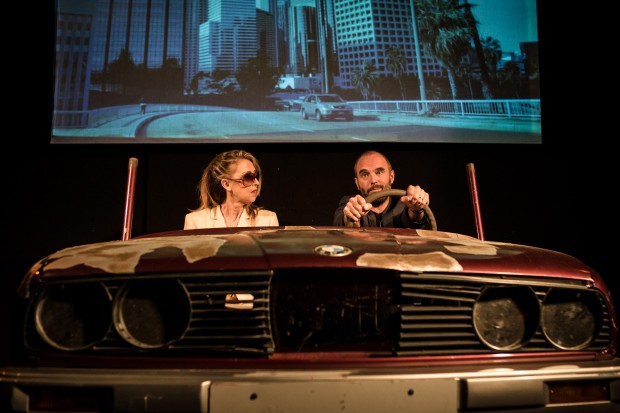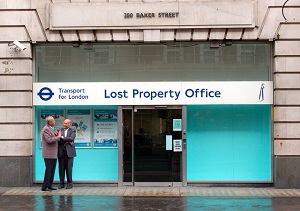You have no items in your cart. Want to get some nice things?
Go shopping
If you were asked to name a place you felt safe, I doubt “inside a car” would be the first answer to pop into your head. After all, not many people would consider themselves invulnerable in such an enclosed, claustrophia-inducing space, or while travelling on dangerous roads. Yet the peculiar brand of safety being in a car – with one other person by your side in the passenger seat – conjures up is the subject acclaimed playwright Neil LaBute chooses to explore in his series of short pieces, Autobahn. Last week, the show was granted its UK premiere at the King’s Head Theatre on Upper Street, Islington, and while it springs from the highly American concept of the road trip, the production was a great example of the universality afforded by simple ideas executed with panache.
The King’s Head – the first pub theatre to be established (by Dan Crawford in 1970, as the programme informs us) since Shakespeare’s time – proves the ideal venue for these seven thematically linked vignettes, which rely heavily on the intimate atmosphere such a space imbues. With only a car’s chassis to act in, and when many of the sketches could more accurately be described as monologues, the four performers – who are members of the Savio(u)r company – have to work extremely hard to maintain our interest in the goings-on on stage, and they perform this task for the most part with aplomb. Static though Autobahn may be, it is also riveting – and that’s thanks not only to a very talented cast but also LaBute’s great naturalistic dialogue. Each piece sees a couple from varying walks of life and of varying ages engage in a discussion of some fairly heavy issues, and focuses on the interplay between those who speak a great deal and their respective listeners. In some cases, as with the four quasi-monologues scattered throughout the evening (“Funny”, “All Apologies”, “Long Division” and title piece “Autobahn”), the listener is almost silent while the speaker tries to convince them to come round to their point of view, or riles them up to get a reaction as in the opening piece “Funny”. We are invited to consider who has more power – the speaker or the listener? And – it transpires – it’s often not the party you might expect.
Although the four performers – two men and two women – are all given their chance to shine via the allocation of the pieces, top marks for versatility have to go to Zoe Swenson-Graham, who dominates each of the four sketches she appears in and whose exceptional physical acting and character work make her a force to be reckoned with. Whether portraying a testy teenager who turns out to be a recovering alcoholic and drug addict, or a troublingly innocent young girl caught up in a sinister situation beyond her control, Swenson-Graham convinces utterly. Her fellow actress, Sharon Maughan, may not be given the same chance to display her range but also impresses – particularly in the final sketch “Autobahn”, helping to bring all seven pieces together in a touching closing speech – and amuses in equal measure. Her subtle facial acting is a joy to behold when she takes the role of listener, and her comic timing in the most humourous of the Act One pieces, “Merge”, ensures the show never feels too overwhelmingly dark or ominous.
That’s not to say there aren’t tense moments – my favourite of the post-interval sketches, “Road Trip”, is perhaps the most successful of all of LaBute’s short plays, and centres on Swenson-Graham’s naive character and the audience’s slow realisation that the older man she has embarked on the titular journey across America with may not be all he first appears. Both players in “Road Trip” – the older man played by Henry Everett – manage the twists and turns of the narrative exceptionally well, and the result is a gripping thriller to keep the audience on our toes and on the edge of our seats. On the lighter side of things is “Bench Seat”, navigating the turmoil of adolescent courtship and with strong performances from Swenson-Graham and Tom Slatter – the latter acting as the perfect foil for his partner’s tightly wound, borderline psychotic energy. Only two out of the seven sketches – an impressive hit rate – didn’t quite work for me: “All Apologies”, in which Everett is called upon to unleash a slightly over-the-top tirade directed at his wife (though his frenetic performance saves the piece from being a complete failure) and “Long Division”, in which one man convinces another to take revenge on his ex-girlfriend. All in all, I felt the two-handers were more effective than the monologues, giving full rein to LaBute’s enviable skills with lifelike, awkward dialogue. However, as an exploration of bathos and the idea of facing the truth and the minutiae of relationships with nowhere to run or hide, Autobahn is both extremely successful and intriguing: a short-play cycle I hope can reach as wide an audience as possible. Who’d have thought so much humanity could be contained in a car?

About Michael Reffold
Michael is a graduate of Lancaster University, with a Master's in European Languages and Cultures following swiftly on from a BA in English Literature and Creative Writing. He loves all aspects of theatre – both watching and performing, being a keen amateur actor. He is currently a Senior Editorial Assistant at BioMed Central and a casual duty manager for Theatres Trust.




